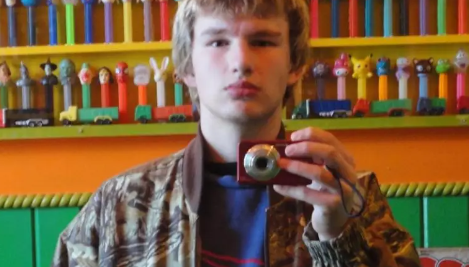
On Oct. 28, Tyler, The Creator — known as the chameleon of rap — showed us his new colors with the release of his eighth studio album, “Chromakopia.” Due to a track record of releasing well-regarded and unique albums, the anticipation for this album was through the roof and no one really knew what this project would be like. That didn’t stop people from trying to predict what was coming. Whether they thought it would be an album influenced by jazz, pop, or West Coast gangster rap, they all missed the mark, as the album fell closer to the genres of rap and rhythm and blues (R&B).
The first sign of “Chromakopia” came in the form of a short clip posted to his Instagram account on Oct. 16, sending waves of excitement online. Unlike Tyler’s typical bright and bold color palettes, the video was a mostly black-and-white clip showing Tyler sporting a captain’s outfit, a mask, and a horn-shaped haircut. The 12 day album rollout was a breath of fresh air compared to some artists who can take months or even years to release an album after starting to promote it.
Every Tyler album differs from the last, so you may be wondering, what makes this album different from the rest? It’s not necessarily the production. This album, like his prior albums, is produced almost completely by himself with few samples and a heavy usage of pianos, keyboards, and synths. This album’s uniqueness instead lies in the lyrical content of the songs. It’s his most mature album to date, with almost every song diving deeper into various personal aspects of his life.
The album opens with “St. Chroma,” easing the listener into the album and featuring vocals from Daniel Caesar. It starts with Tyler whispering over the sound of people marching, gradually building into a beat with synths and keyboards. The song also includes an audio clip of his mom delivering an inspirational speech. The album then jumps into “Rah Tah Tah” — an energetic, fun song — and then “Noid,” which talks about the paranoia and distrust he feels due to his fame and celebrity life.
“Darling, I” follows “Noid,” using a catchy chorus that features backup vocals from Teezo Touchdown. After the chorus, Tyler talks about his inability to settle down, accepting this by saying: “I’ll be lonely with these Grammys when it’s all said and done.”
The next three songs, “Hey Jane,” “I Killed You,” and “Judge Judy,” are all letters to former relationships. This is where Tyler really starts to get vulnerable on the album as he speaks in each song directly to whomever the song is about.
The second half of the album kicks off with what I think is the most fun song on the album, “Sticky.” This track takes a break from expressing heartfelt emotions, including verses from the featured artists GloRilla, Sexy Redd, and Lil Wayne.
Directly following that, “Take Your Mask Off” brings the album right back to a serious tone. The song tells three stories of people hiding their true selves, and we hear another audio clip from Tyler’s mom giving advice to be yourself. It additionally features vocals from Daniel Caesar and LaToiya Williams. Continuing with that tone, “Tomorrow” is a slower song where Tyler reflects on getting older and changing as a person.
Following that song, the album returns to the fast paced tone with the song “Thought I Was Dead.” This song is upbeat and aggressive, featuring ScHoolboy Q who worked with the production of the song along with his verse, and vocals from Santigold. This song takes shots at his haters; specifically, some think the line, “White boys mocking’ this sh*t and y’all mad at me?” is a shot at the rapper Ian, who Tyler took a subliminal shot at on Springhill in an interview with Maverick Carter.
Tyler goes back to a song with more personal lyrics with “Like Him,” which is about his absent father and one of the deepest songs on the album. This is a theme he has discussed previously in songs like “Answer” from his second album “Wolf.” In “Like Him” Tyler uses another audio clip of his mom, where she explains that she kept his father from him despite his father wanting to be there.
The 13th song on this album, “Balloon,” returns to the fun tone with a fast keyboard beat and a verse from Doechii. The 14th and final song on “Chromakopia” is “I Hope You Find Your Way Home,” which reflects on both his life and on the album. This reflection acts as a good send off for the project.
“Chromakopia” left many of his fans divided. Some critics, like Anthony Fantano of The Needle Drop, thought it was a little disappointing, citing a lack of creativity in production and no hard hitting songs. Fantano said, “I don’t feel like he spent enough time further developing his sound in a way to where it would come across as something genuinely new.” In contrast, others resonated strongly with the very personal themes covered in the album.
I got the opinion of Franklin senior Oliver Giles. Giles is among those who were disappointed by the album, stating, “The production felt a little uninteresting compared to his other albums … I was hoping for something more unique from him.” I also talked to Brianna Reyes, a Tyler fan of many years, who was anything but disappointed. Reyes says, “I think this was his best work so far. I believe the feelings and emotion [of] this album resonated with a lot of people, and I thought it felt like a more mature ‘IGOR’ [Tyler’s 2019 album].”
However, both agreed that the features were a strong point of the album with Giles explaining, “The features were pretty good and none of them made any song worse. I think Daniel Caesar had the best features.” Reyes added, “I enjoyed all the features Tyler had, I think he truly featured artists who are passionate about music and match his level of skill and talent, making the album perfect.”
This album was a way for Tyler to both express his feelings in song form and also show that he’s still got the talent to make a great album. Most of the songs sound like they could have come from one of his previous albums, with songs like “Rah Tah Tah” and “Thought I Was Dead” fitting right in on “Cherry Bomb,” and “Darling, I” fitting nicely on “Igor.” While not the most innovative album, to me, “Chromakopia” feels like a solid recap of his life at 30 and is definitely worth a listen.


































